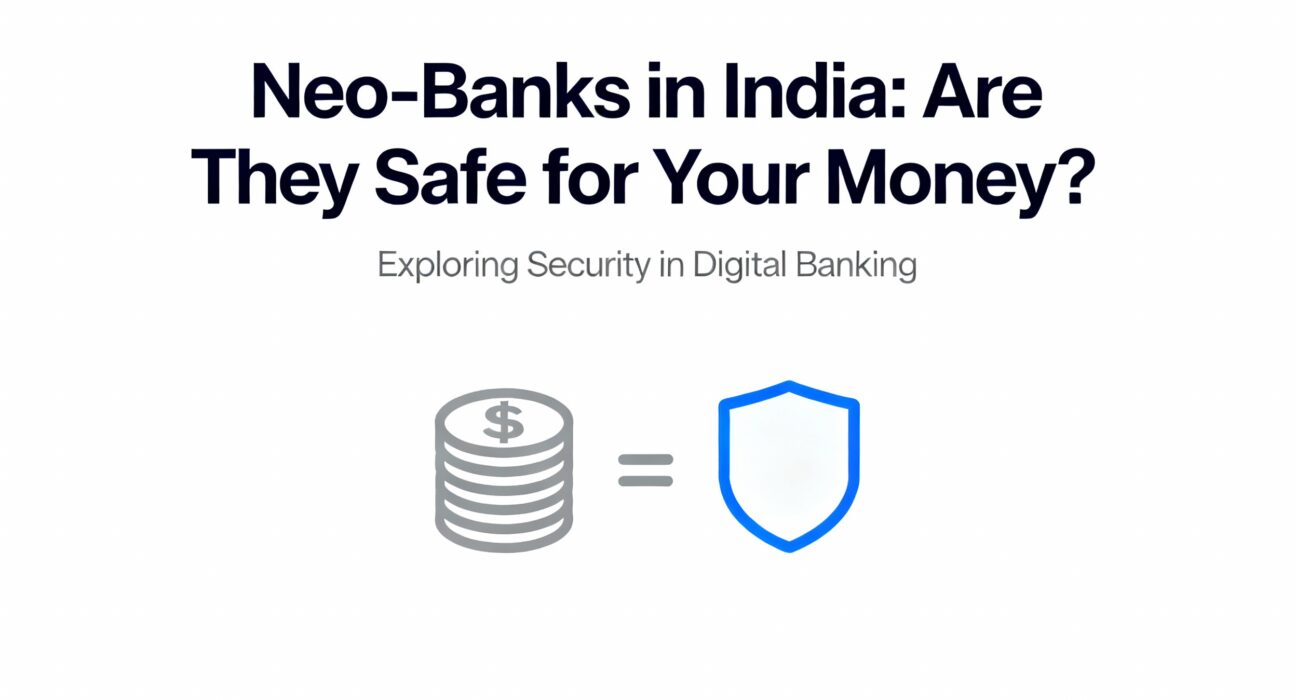India’s banking landscape is going through one of its most disruptive phases yet. Just a decade ago, opening a bank account meant waiting in long queues and signing multiple papers. Today, a teenager can open a digital savings account in minutes while sitting on their couch. Most of this shift can be attributed to neo-banks — a digital financial platform designed for a generation that prefers everything to be quick, paperless, and mobile-first.
What Are Neo-Banks?
Neo-banks are digital banks that operate fully online, with no physical branches, and offer their financial services through mobile and web applications. Besides, they rely on technology, automation, and customisation to provide a seamless user-friendly experience, similar to that of traditional banks.
Nonetheless, in India, neo-banks are not granted a banking license. Banks do not require a banking license issued by the Reserve Bank of India (RBI). Instead, they cooperate with banks under the supervision of the RBI to offer various services, including savings accounts, debit cards, payments, and fixed deposits.
Some of the popular names in India are:
- Fi Money (in partnership with Federal Bank)
- Jupiter (in partnership with Federal Bank)
- Niyo (in partnership with banks like SBM & DCB)
- Open (in partnership with ICICI, Axis, and others)
- RazorpayX (for businesses, in partnership with RBL Bank)
So technically, when you open an account on a neo-banking app, your money is not held by the neo-bank itself — the partnered licensed bank holds it.
How Safe Is Your Money in a Neo-Bank?
Yes, your cash is mainly safe, but only because it is kept in a partner bank regulated by the RBI, not because the neo-bank itself is secure. Let’s examine the safety layers step-by-step:
- Your funds are deposited in a bank approved by the RBI.
Neo-banks are not permitted to be licensed; therefore, they often collaborate with traditional banks. For instance, if you deposit ₹20,000 in a neo-bank app, that amount will be held in a government-regulated bank, such as Federal Bank, ICICI, or SBM Bank, among others.
- The government shields the deposits through Deposit Insurance.
The DICGC (Deposit Insurance and Credit Guarantee Corporation) provides insurance coverage for bank deposits up to ₹5 lakh per customer per bank, funded by the government. This implies that if the partner bank goes down (a very unlikely but possible scenario), the money you have up to ₹5 lakh will still be protected.
- Regulated services that include UPI and cards.
Their payment system operates on NPCI-licensed UPI rails and utilises bank-issued Visa/Mastercard/RuPay cards, all in compliance with current financial regulations.
What’s the Risk associated with NeoBanks?
If your money is stored in licensed banks, what’s the concern with neo-banks?
- They are not directly regulated like banks
Neo-banks operate in a legal grey zone. They must follow fintech and partner bank compliance, but they are not independently regulated by the RBI, unlike banks.
- No physical branch support
When something goes wrong — such as a payment being stuck, card fraud, or a KYC issue — you only have customer support chats and emails, not a physical bank to visit. This becomes frustrating for many users.
- Dependency on partner banks
If the partner bank faces issues, regulatory trouble, or decides to end the partnership, the neo-bank’s services can be disrupted. In the past, fintech companies in India have experienced temporary freezes due to their banking partners’ compliance concerns.
- Growing fraud in digital banking
Although neo-banks employ robust security measures, rising cases of phishing, fake apps, UPI scams, and social engineering attacks put the user at risk, rather than the bank itself.
What Does RBI Say about Neobanks?
The RBI has repeatedly warned users that neo-banks are not licensed banks. It restricts them to operate through partnerships and fintech regulations only. The central bank’s vigilance is due to the following reasons: Neo-banks are handling a significant amount of customer data.
There is a rapid increase in cyber risks, and indirect regulation could compromise consumer protection. However, the Reserve Bank of India has embraced technology by introducing regulations for digital banking units for supervised banks. It is also experimenting with frameworks that may shape the future of digital banking in India.
Advantages of Neo-Banks
With all their drawbacks, neo-banks still manage to gather a certain number of loyal users thanks to their distinct benefits:
- Complete digital onboarding
- No paperwork, no visiting the bank
- Instant alerts and understanding of spending
- Intelligent tools for budgeting and analytics
- Accounts with no or low minimum balance
- Quicker customer service (in comparison to traditional banks)
- Targeted towards millennials, Gen-Z, and freelancers
Who Should Use Neo-Banks?
Neo-banks work best for:
- Students
- Young professionals
- Freelancers
- Small business owners
- Tech-comfortable users
- People looking for spending insights and seamless UI
Best Practices to Stay Safe
These are the rules you should always respect, no matter what platform you are using:
- Switch on biometric or two-step authentication
- Do not disclose card details, UPI PIN, or OTP
- Do not use public Wi-Fi when transacting
- Download apps from the official Play Store/App Store only
- Keep an eye on your account activity regularly
Conclusion
In India, neo-banks are not inherently risky, but they differ from conventional banks. Your funds are safe because they are held by a licensed partner bank and not by the neo-bank. They offer incredible convenience, modern features, and faster services, but they still rely on traditional banking infrastructure and regulatory oversight through partnerships. Using neobanks as a smart secondary account for daily spending, savings insights, and financial management is where they excel.
Frequently Asked Questions
No, neo-banks in India are not licensed by the RBI. They operate in partnership with RBI-licensed banks that hold customer funds and provide regulated services like savings accounts, debit cards, and UPI.
Yes. Since your money is stored in a partnered RBI-licensed bank, it is insured by DICGC (Deposit Insurance and Credit Guarantee Corporation) for up to ₹5 lakh per customer, per bank, in case the partner bank fails.
Your funds remain safe with the partner bank, not the neo-bank itself. However, services like app access, card usage, and digital features may be disrupted temporarily until a new partnership or alternative arrangement is in place, as seen in past fintech cases.
Disclaimer: The information provided in this article is for educational and informational purposes only and should not be considered financial, legal, or investment advice. While efforts have been made to ensure accuracy, banking regulations, partnerships, and digital financial policies may change over time. Users are advised to conduct their own research or consult a qualified financial professional before making any financial decisions.

